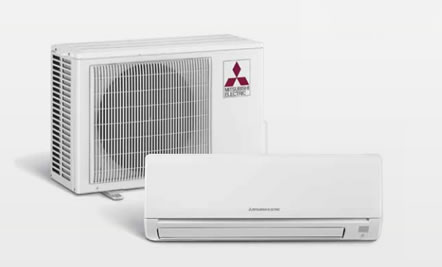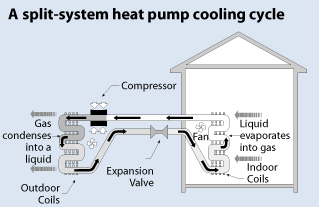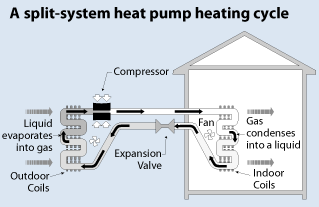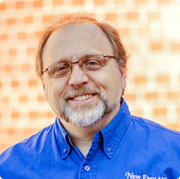“Heat pumps” are well known to HVAC professionals and energy-efficiency experts. Heat-pump based systems have been used for years in milder climates to warm and cool homes and other buildings. In the past few years, the technology has improved to the point that heat pumps are now becoming popular in colder climates like New England.
What is a heat pump?
It’s a bunch of equipment that collects heat from the air, water or ground, and transfers it to another space, or a body of water. They’re ultra energy efficient because they move heat instead of creating it like your oil-burning furnace does (or most other traditional heating systems).
The term “heat pump” is confusing because it suggests that the devices are only for heating. Actually, they move heat in whatever direction is desired. Heat pumps move heat out of a warm space (air conditioning) or into a cold space (heating.) That’s the magical thing about heat pumps.
You already have a heat pump in your home. It’s your refrigerator. Your fridge stays cool by pulling warm air out of the fridge and moving it into your kitchen. That’s why parts of your fridge are warm to the touch or you feel a warm breeze on your bare feet when you walk by on a cool morning.
Cool. What else can heat pumps do for me?
Heat pumps in the home include:
- Air-to-air: A ductless mini-split transfers heat between the outside and inside of your home. Ducted air-source heat pumps are also available.
- Ground-to-air: A geothermal system transfers heat to or from the ground water near your home to or from the air in your home.
- Air-to-water: A heat pump water heater draws heat from your home to heat the water in your water tank.
Tell me more about mini-splits.
Traditionally, heat pumps run on electricity. The electricity powers a compressor and fluid/gas circulator pump. That means they work great with a New England Clean Energy solar energy system. If you combine a mini-split with a solar electric system, you can use your solar to heat and cool your home, and have truly emissions-free, guilt-free A/C and shoulder season heat. Because they’re ductless, they’re easy and quick to install, and don’t require tearing up your walls or ceilings.
Mini-splits are often smaller than typical heat pumps, hence the “mini” in the name. And like many HVAC systems, they are “split” – in this case, into an outdoor and indoor unit(s).
How does a heat pump actually work?
Hot or cold air doesn’t actually move through a heat pump. That’s where phase change comes in. Phase change is a process where a substance changes from solid, liquid or gas, to another form. For example, water transitions from liquid to gas by evaporation or from gas to liquid by condensation. Here’s a fun one: did you know mothballs (1,4-dichlorobenzene) transition from solid to gas under normal atmospheric conditions (called sublimation)?
As it turns out, when a gas condenses (or is condensed) to a liquid, the condensing substance cools down. Put another way, the process gives off heat. When liquid evaporates (or is evaporated) to a gas, the evaporating substance heats up – the process draws in heat.
I said above that electricity powers a compressor in a heat pump. The compressor causes the gas in the heat pump to undergo a phase change to liquid, or an evaporator causes the liquid to change to gas, creating the desired cooling or heating effect.
These diagrams from energy.gov illustrate how a heat pump works. Notice how the same system works for heating or cooling; only the direction of the arrows changes.
You’ve whetted my appetite. Where can I learn more?
The Internet has plenty of resources on heat pumps, including energy.gov and this article.
If you liked this article, you might also enjoy:








